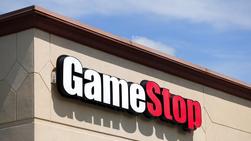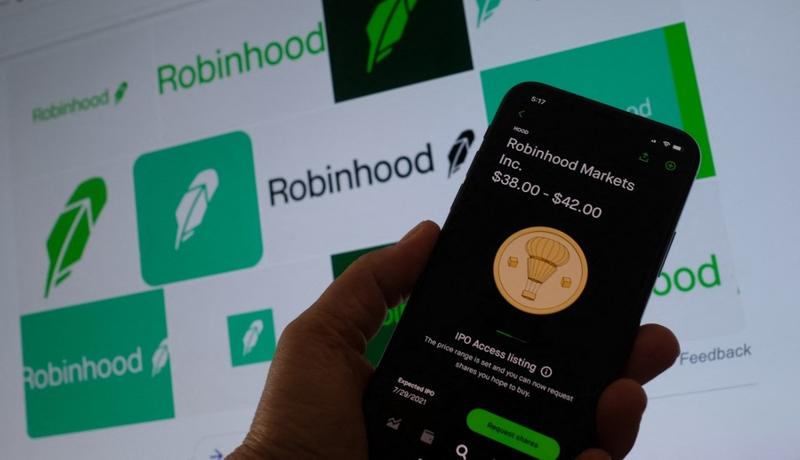 A specialist works at his post on the floor of the New York Stock Exchange on July 28, 2021. (RICHARD DREW / AP)
A specialist works at his post on the floor of the New York Stock Exchange on July 28, 2021. (RICHARD DREW / AP)
LONDON - The trillion-dollar retail investment express is losing steam, dampening the fortunes of British trading platforms that boomed during lockdowns on the back of a meme stocks frenzy.
Many stock-pickers are steering clear of a turbulent market as living costs rise and the economy teeters, squeezing the business of consumer investment platforms that are facing falling fees and thinning margins.
Even the biggest fish, such as FTSE-listed Hargreaves Lansdown and AJ Bell and those owned or recently acquired by major banks and asset managers, are struggling with wilting flows of new customers and money.
Many stock-pickers are steering clear of a turbulent market as living costs rise and the economy teeters, squeezing the business of consumer investment platforms that are facing falling fees and thinning margins
Britain's biggest bank Lloyds told Reuters in an interview last month that inflows to its retail investment platforms - which boast 19.5 billion pounds ($24.2 billion) of customer funds - slowed in the first quarter of 2022 versus a year before, and more clients were selling than buying stocks.
The "sugar rush" of the social media frenzy that propelled stocks like GameStop last year has worn off for investment platforms, said Mike Barrett, director at financial services consultancy the Lang Cat.
ALSO READ: GameStop mania: Wall Street elites vs online grassroots
"Publicly, these businesses say they're more comfortable that their customers are doing sensible trades rather than going after some meme stock. But unfortunately, that has had a negative impact on their revenues," he added.
The market is more daunting for the smaller investment platforms, with around half of them - seven out of 13 reviewed by Reuters - posting losses in their most recently filed annual accounts, according to a review of documents at UK Companies House.
Although accounting periods varied, the seven loss-makers included OpenMoney and PensionBee, who posted numbers for the year ending December 2021.
 In this May 7, 2020 file photo, a GameStop store is seen in St. Louis. Two hedge funds are bowing out of their short positions on the money-losing video game retailer. (JEFF ROBERSON / AP)
In this May 7, 2020 file photo, a GameStop store is seen in St. Louis. Two hedge funds are bowing out of their short positions on the money-losing video game retailer. (JEFF ROBERSON / AP)
The market is more daunting for the smaller investment platforms, with around half of them - seven out of 13 reviewed by Reuters - posting losses in their most recently filed annual accounts, according to a review of documents at UK Companies House
OpenMoney's managing director Hayley Millhouse said the company's founders were taking a "long-term view to achieve profitability", partly by diversifying its services.
Romi Savova, CEO of PensionBee, said its product was "exceptionally long-term". She said, though, that startups would likely struggle to raise finance in the current environment, adding she expected fewer new platforms to launch this year.
Reporting losses is common for startup fintech firms, which early on typically prioritize reaching critical mass over turning a profit.
Yet fierce competition and the mounting cost-of-living crisis may nonetheless stymie the sector's growth this year, weeding out weaker players or making them takeover targets, according to many of the 15 platform managers, financial advisers and analysts who spoke to Reuters.
It's not just a problem for British platforms; US pandemic darling Robinhood posted a 43 percent fall in quarterly revenue in April and said it was laying off a tenth of staff, sending its stock to record lows.
ALSO READ: US regulators to meet as brokers curb Reddit-trader mania
"I can see a few of the smaller platforms either coming together or maybe a major player acquiring them," said Oliwia Berdak, financial services research director at Forrester. "We had an influx of new investors in the pandemic. The question is, will those people now flee?"
 This photo illustration shows a person looking at a smartphone with the projected Robinhood price shares in Los Angeles, July 27, 2021. (CHRIS DELMAS / AFP)
This photo illustration shows a person looking at a smartphone with the projected Robinhood price shares in Los Angeles, July 27, 2021. (CHRIS DELMAS / AFP)
Wall Street giant JPMorgan snapped up loss-making British platform Nutmeg last year, and a collapse in tech valuations broadly could make other start-up platforms attractive targets, analysts said.
British bank NatWest is interested in potential buys in the wealth sector, CEO Alison Rose told a financial conference in Rome last week.
"I think there are opportunities to look at acquisitions in that space if they are compelling," she said.
Yet fierce competition and the mounting cost-of-living crisis may nonetheless stymie the sector's growth this year, weeding out weaker players or making them takeover targets, according to many of the 15 platform managers, financial advisers and analysts who spoke to Reuters
True cost hasn't sunk in
It's a very different scene from 2021, when new customer numbers across the "direct-to-consumer" investment sector ballooned, with several platforms reporting record joiners. Growth was fueled by the social media-driven meme stock frenzy which saw an army of small investors pile into shares of GameStop, AMC and other once-unfashionable companies.
But this year many individual investors, who watched their wealth grow during the historic rally in financial assets earlier in the pandemic, have been left nursing losses as stock prices have slid at a time of conflict in Europe and rampant inflation.
The assets held by Britain's consumer investment platforms fell 2.5 percent to 906.8 billion pounds ($1.1 trillion) in the first three months of 2022 versus the end of 2021, according to data from industry tracker Fundscape
ALSO REAd: S.Korea retail investors flock to YouTube for stock trading advice.
Manuel Pardavila-Gonzalez, managing director of Lloyds' retail investment platforms, told Reuters that the cost-of-living crisis may derail the bank's forecast of 1.7-1.8 billion pounds of net inflows of customer funds this year, although it does not expect significant outflows.
"The true cost of living has not totally sunk in with households," he said.
Lloyds' platforms pulled in 400 million pounds of net inflows in the first quarter, down a fifth on the 500 million the previous year.
 The secondary central business district of Canary Wharf is pictured as the sun sets in London on May 8, 2021. (JUSTIN TALLIS / AFP)
The secondary central business district of Canary Wharf is pictured as the sun sets in London on May 8, 2021. (JUSTIN TALLIS / AFP)
It's a very different scene from 2021, when new customer numbers across the "direct-to-consumer" investment sector ballooned, with several platforms reporting record joiners. Growth was fueled by the social media-driven meme stock frenzy which saw an army of small investors pile into shares of GameStop, AMC and other once-unfashionable companies
So far this year, new customers numbers are down more than half on a bumper 2021, Pardavila-Gonzalez said, while the proportion of sell trades to buy trades has also shifted, from around 50:50 last year to 55:45 in favour of sales, with more people sitting on cash.
Hargreaves Lansdown and AJ Bell are also feeling the heat.
Customers still added more funds than they withdrew in the last few months, the companies said, but new joiners fell sharply at both platforms compared to the prior year, down two-thirds and nearly a third to 42,000 and 36,000 respectively.
The gloom is reflected in their share prices, with Hargreaves Lansdown down 41 percent and AJ Bell 27 percent in 2022, compared with a 4 percent fall in the FTSE 350 Index.
Hargreaves Lansdown said the industry had seen many periods of lower investor confidence and lower flows over the years.
"It is the resilient providers who focus on supporting their clients who fare best," said the company, adding that it expects the potential size of Britain's wealth market to grow from 1.4 trillion pounds in 2021 to 1.8 trillion by 2025.
'Race to zero on fees‘
Such resilience may be a harder trick to pull for many of the less-established players elbowing their way forwards.
The review of annual accounts filed to Companies House, a government agency, found that most of the 13 mainly small and mid-sized platforms had reported losses.
However the annual accounting periods of many of these companies varied, with the end date ranging between December 2020 to December 2021, thus potentially giving an outdated snapshot of some of the companies' finances.
Intensifying competition on customer fees is also pressuring smaller players, experts said, with bigger platforms benefiting from an older, less price-sensitive client base
This is because most are private firms, which in Britain have up to nine months to post accounts. Companies that were exempt from filing full accounts because they were too small were excluded from the review.
Freetrade, which saw pretax losses nearly double in the year to September 2021, said it had sufficient momentum to ride out any downturn. It said the loss reflected expansion and a focus on increasing its customer base during the period, adding it was making progress towards profitability.
Another loss-maker, Moneyfarm, said a recent funding round led by asset manager M&G reinforced the strength of its business model, which includes offering customers some advice.
"We do think that there will be a degree of churn within our industry – those who fall by the wayside are likely to be those who ... have a minimal relationship with their customers," said CEO Giovanni Dapra.
Intensifying competition on customer fees is also pressuring smaller players, experts said, with bigger platforms benefiting from an older, less price-sensitive client base.
READ MORE: Regulator unveils plan to overhaul Wall Street stock trading
"There is a race to zero on trading fees," said Berdak at Forrester. "Margins are very, very thin. So it's about scale."


